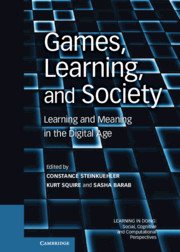Book contents
- Frontmatter
- Contents
- Contributors
- Series Foreword
- Foreword
- Acknowledgments
- Section I Games as Designed Experience
- Section II Games as Emergent Culture
- 10 Introduction to Section II
- 11 Nurturing Affinity Spaces and Game-Based Learning
- 12 Apprenticeship in Massively Multiplayer Online Games
- 13 Theorycrafting
- 14 Culture and Community in a Virtual World for Young Children
- 15 Culture versus Architecture
- 16 Participatory Media Spaces
- Section III Games as Twenty-First-Century Curriculum
- Index
- References
13 - Theorycrafting
The Art and Science of Using Numbers to Interpret the World
Published online by Cambridge University Press: 05 August 2012
- Frontmatter
- Contents
- Contributors
- Series Foreword
- Foreword
- Acknowledgments
- Section I Games as Designed Experience
- Section II Games as Emergent Culture
- 10 Introduction to Section II
- 11 Nurturing Affinity Spaces and Game-Based Learning
- 12 Apprenticeship in Massively Multiplayer Online Games
- 13 Theorycrafting
- 14 Culture and Community in a Virtual World for Young Children
- 15 Culture versus Architecture
- 16 Participatory Media Spaces
- Section III Games as Twenty-First-Century Curriculum
- Index
- References
Summary
Encountering the Big Bad Wolf
A World of Warcraft player sits at her desk, mouse rapidly moving back and forth as the camera angle on the monitor changes to give her a better view of her surroundings and teammates. Her other hand is steadily tapping away at the keyboard, selecting teammates and in most cases giving them a much-needed heal or protection bubble. One of her other teammates, in another room across the country, is watching numbers fly by, making sure that she is applying the correct rotation of skills as well as watching her position – is she still behind the boss, or did the tank just shift him? Does she need to reapply that damage over time because the timer ran out, or can she use a finishing skill to rebuff her attack-speed increase? The boss encounter runs for roughly only five minutes, and the team is successful. While distributing the loot, one of the raid leaders posts the results of the boss fight in the form of a damage meter and a healing meter (Figure 13.1).
In this scenario, World of Warcraft players are “raiding”; that is, they are engaged in a tightly coordinated activity of between ten and forty people in which they collaborate to slay fantasy monsters. In their desire to play as effectively as possible – to defeat the monsters and to perform well in front of their peers – raiders engage theorycraft, that is, analysis of game mechanics. Game mechanics specify the rules that produce game outcomes. Paul (2009) describes theorycrafting as a metagame, a “game outside the game.” Games such as World of Warcraft are complex, and players cannot discover everything they want to know simply by playing. Some players, then, undertake mathematical and logical analyses to interrogate the game more deeply. They share their analyses with other players on forums and blogs.
- Type
- Chapter
- Information
- Games, Learning, and SocietyLearning and Meaning in the Digital Age, pp. 185 - 209Publisher: Cambridge University PressPrint publication year: 2012
References
- 9
- Cited by

